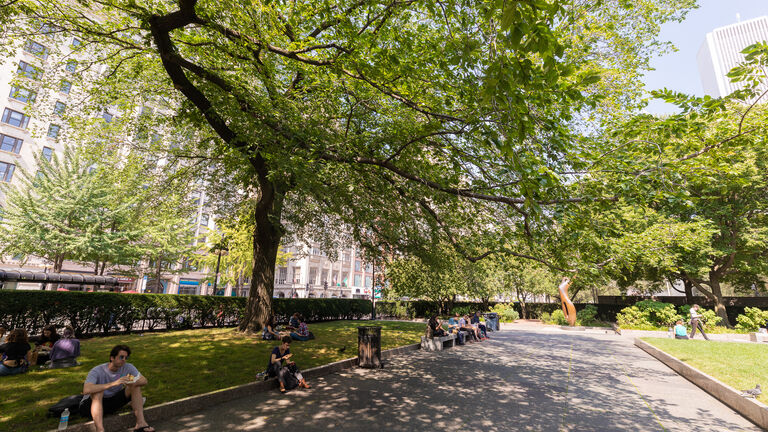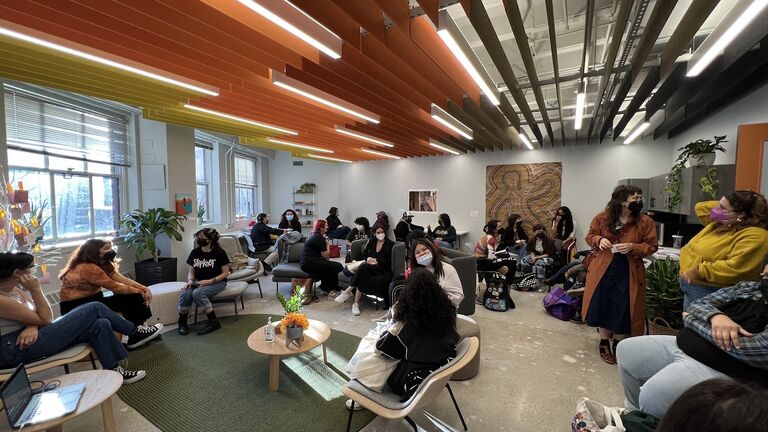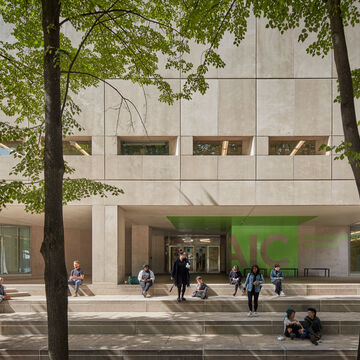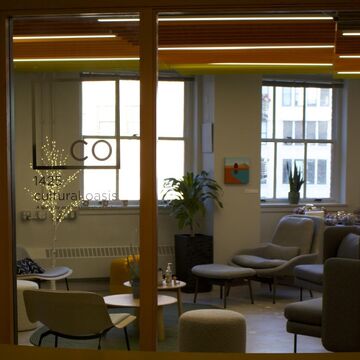
Diversity, Equity, & Inclusion
The Office of Diversity, Equity, & Inclusion
The Office of Diversity, Equity, & Inclusion leads the School of the Art Institute of Chicago's dynamic schoolwide strategy for advancing diversity, equity, inclusion, access, and anti-racism (DEIA+AR). The office works in collaboration with other SAIC leaders, faculty, staff, students, alumni, community members, and key stakeholders. One of the essential responsibilities of the office is to provide vision, direction, coordination, and support to the DEIA+AR ecosystem at SAIC. This webpage reflects the ongoing work of the office as well as the many initiatives that SAIC faculty, staff, and students are leading at the school and in our community.

Our Mission
SAIC's primary purpose is to cultivate a welcoming and inclusive art and design school that animates the discovery and development of significant ideas and images. The School is committed to creating an equitable and just environment that values and respects its diverse community of faculty, students, and staff so that all at SAIC can have the opportunity to flourish.
Living Land Acknowledgement
The Office of Diversity, Equity, & Inclusion at SAIC recognize the Peoria Tribe, the Potawatomi, the Myaamia (Miami), and the Kiikapoi (Kickapoo) as the original and current keepers and protectors of the unceded land and air where its offices exist on South Wabash Avenue and the surrounding area where the School of the Art Institute of Chicago currently occupies. The office also acknowledges the enduring and compounded impact of colonization, racism, displacement, and disenfranchisement that continues to impact the ways of life for our local Indigenous communities, including their artists and artisans.
The office was established to advance SAIC’s commitment to creating a diverse, equitable, inclusive, accessible, and anti-racist school, which includes holding ourselves accountable by working to hire, admit, affirm, support, and retain Native and Indigenous artists, designers, and scholars. Our office is also excited to cultivate authentic relationships with contemporary Native and Indigenous artists, creatives, cultural workers, knowledge holders, and community partners in the Shikaakwa (Chicago) area and beyond.
If you would like to join our office in these ongoing reparative commitments or would like to learn more about Native and Indigenous programming, events, resources, and course content at SAIC, feel free to contact diversity.saic@edu.
Community Care and Safety
If you have experienced or witnessed an incident of bias, discrimination, or harassment within the SAIC community, please contact SAIC’s Title IX Office. To speak with a confidential source regarding sexual assault or intimate partner violence, students are encouraged to call Counseling Services at 312.499.4271 and faculty and staff are encouraged to call the Employee Assistance Program at 800.311.4327. If you are seeking a confidential source of support or resources for conflict mediation, please contact the Ombuds Office. If you are a student in need of accommodation, please contact the Disability and Learning Resource Center. If you are an employee in need of workplace accommodation, please contact Employee Relations at employee_relations@artic.edu. Students can also connect with the Deans on Call, a group of staff members who are available 24 hours per day, 365 days of the year for consultation and assistance on urgent student matters. They can be reached by calling Campus Security at 312.899.1230.
Non-Discrimination Statement
The Art Institute of Chicago, including both the School and the Museum, is committed to providing an inclusive and welcoming environment for its students, visitors, faculty, and staff, and to ensuring that educational and employment decisions are based on an individual's abilities and qualifications. The Art Institute of Chicago does not tolerate unlawful discrimination based on race, color, sex, religion, national origin, disability, age, sexual orientation, gender identity, military or former military status, or any other status protected by federal, state, or local law, in its programs and activities, public accommodations, or employment practices.

Student Affinity Groups
The director of Student Engagement and the Cultural Oasis coordinator provide supervision, mentorship, and support to Student Affinity groups and their leaders. Approximately one-third of all the student groups are affinity- or identity-based. Student affinity groups are established through the Office of Student Affairs’ Office of Campus Life by SAIC students around a shared interest, ideology, identity, experience, or common goal. These student-led groups are open to all members of the community, and provide opportunities to form meaningful connections. Groups will often host recurring meetings, or organize events such as festivals, symposia, panels, artist talks, and workshops.

Cultural Oasis
The office manages the Cultural Oasis, which was designed by students of color as a dedicated student place to connect across identities, experiences, and artistic practices to support the success and retention of SAIC’s students of color. The center is the realization of an action item of the School’s Anti-Racism Committee, a group of students, faculty, and staff formed in 2020 to identify ways to make SAIC more inclusive and equitable. The Cultural Oasis hosts a variety of programs designed to foster a culture of belonging at SAIC.
Follow Us
Contact Us
Office of Diversity, Equity, & Inclusion
Vice President of Diversity, Equity, & Inclusion
Sekile M. Nzinga (she/her)
Director of Diversity, Equity, & Inclusion for Student Engagement
Karl Constant (he/they)
Director of Diversity, Equity, & Inclusion for Faculty and Staff Engagement
Vaness Cox (she/her)
Coordinator of the Cultural Oasis
Samhita Sonti (she/they)
DEI Graduate Assistant
Israa Darwich (she/her)
Cultural Oasis Graduate Assistant
Jungsoo Kim (she/her)
Cultural Oasis Undergrad Assistant
Hannah Lynch (she/they)
Cultural Oasis Undergrad Assistant
Moly Wu (she/her)